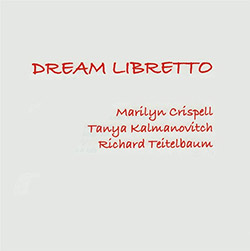
It was not too long after her arrival on the scene in the late 1970s that pianist Marilyn Crispell was pigeonholed as a Cecil Taylor follower. For the next 20 years, that label dogged her to the point that she had to live up to it, willingly or not. By the late 1990s, however, she began toning down the fire and fury on which she built her reputation. The turning point, of course, was her entry into the ECM fold. In the 23 years since that groundbreaking release of Annette Peacock covers (Time Never Was Anyway), Crispell has now become a musician in search of a quieter form of intensity, a fact demonstrated in the six ensuing releases for that famous German imprint. Another good example of her current focus is the present album, surely one of the sparest sounding recordings in her extensive discography.
All told, the program consists of 12 pieces, the first five credited to Crispell and titled Memoria / For Pessa Malka, a suite inspired by the poem Sound of the Downward by Robert Gibbons. While the record jacket indicates that two other musicians are present, the pioneering Richard Teitelbaum on electronics and Tanya Kalmanovitch on violin, these are not really trio pieces at all. The opener features Crispell on a strangely distant piano with a glassy and reverberant sound (electronically processed for sure... by Teitelbaum?). The electronics are vaguely heard as a low drone in that first cut before being exclusively featured in the second and nowhere else thereafter. The violin enters in a hushed duo with the pianist in the third before playing a soliloquy in the fourth and turning it over to the pianist in the finale of this first set. While listed as playing violin, which may well be the case here, Kalmanovitch is a violist by trade. Aural evidence in the remaining seven tracks of this side (improv duos with the pianist) confirms this, as there are pitches clearly below the bottom "G" of the violin. For the most part, the mood is quite reflective, the players pondering their every move in an unhurried way.
While books ought not be judged by their covers, as the old saying goes, this is one disc whose jacket hints at the music in store. Save for the basic discographical data, the tune titles of the last seven tracks (drawn from the aforementioned poem) and a dedication to the pianist's late parents, there is nothing else printed on the bare-bones four panel sleeve. The aura of mystery shrouding this music makes it all the more alluring to listen to.
Comments and Feedback:
|



